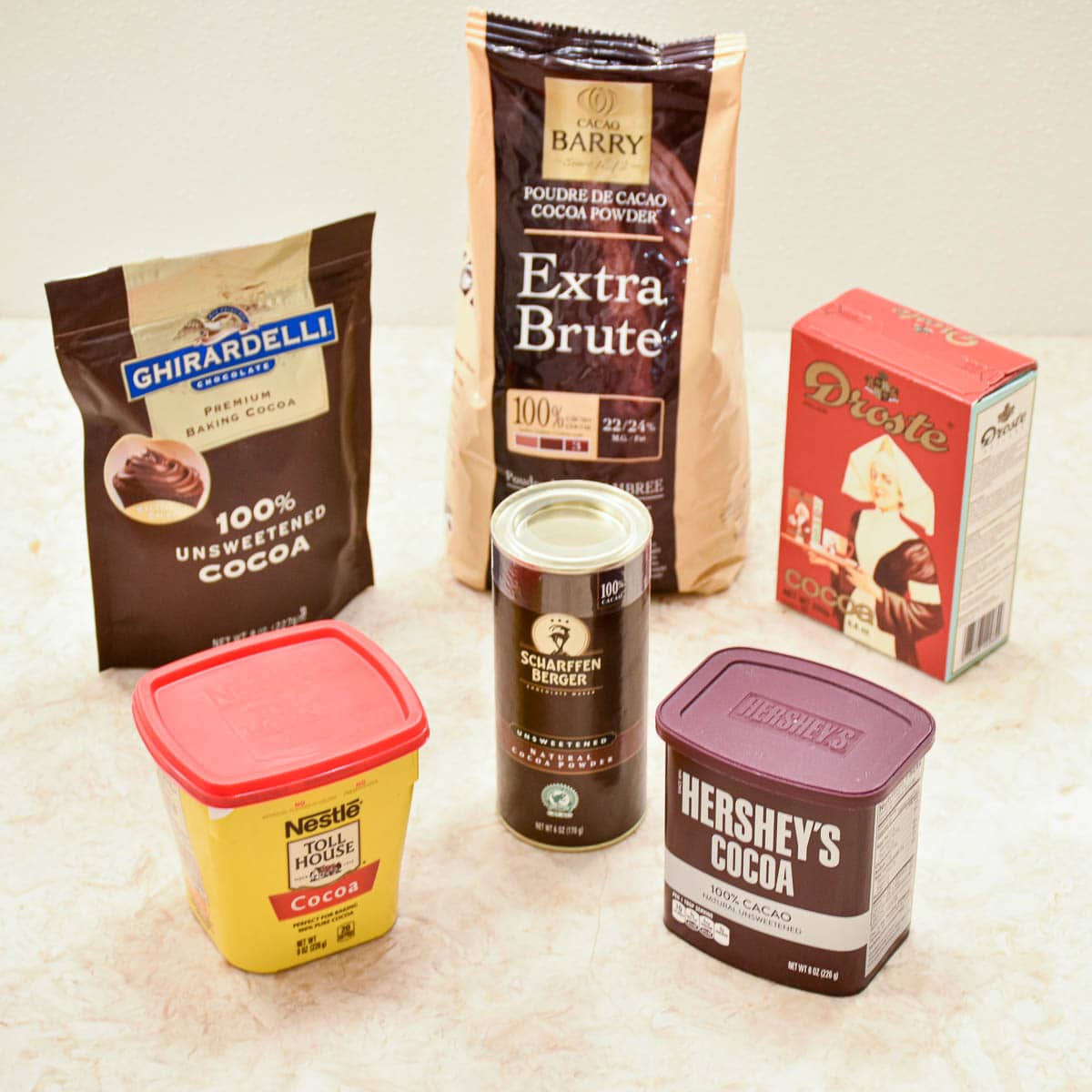
One of my readers and I got into an interesting conversation about the fundamentals of cocoa. It dawned on me I don't have a post about the difference between the dutched and non-dutched or natural cocoa. They can be confusing but understanding them will help.
In a single sentence, the difference between the two is the natural cocoa is acidic and the dutched cocoa isn't. However, there is more to know than that. Because of the acid content or lack of it, which leavening is used makes all the difference.
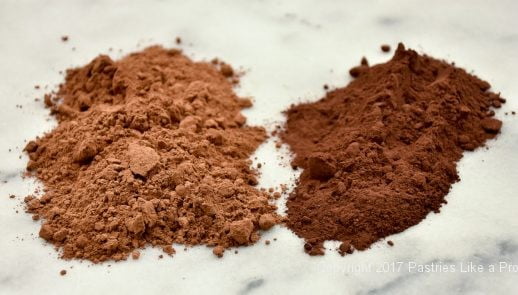
How Cocoa is Made
Cocoa starts out as chocolate liquor (not to be confused with chocolate liquer which is alcoholic drink) and is made by grinding the nib, or meat, of the cocoa bean that has been fermented, dried, roasted and separated from their skins. It’s a thick, gritty, dark brown paste that liquefies when heated. Cocoa is made by removing about three fourths of the cocoa butter drying it again and then grinding the remaining liquor into cocoa. Natural cocoa is lighter in color than dutched.
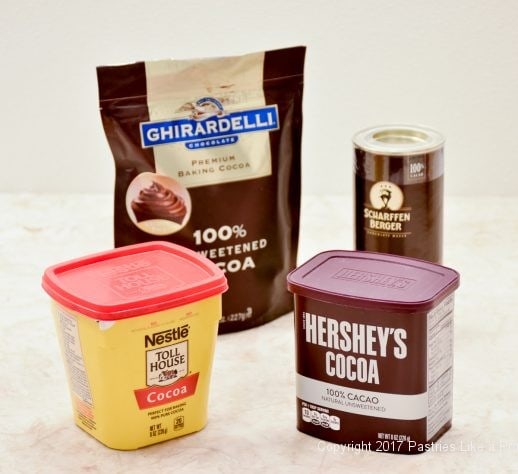
Types of Cocoa
Natural cocoa has a pH of 5 to 6 making it acidic. The color of natural cocoa ranges from tan to a dark yellowish brown depending upon the amount of roasting the original cocoa beans had. The acids in the natural cocoa react with baking soda to produce a small amount of carbon dioxide gas for leavening. Natural cocoa has to have 10% cocoa butter by law in the U.S. Natural brands include: Hershey's, Ghirardelli, Nestle Toll House and Scharffen Berger.
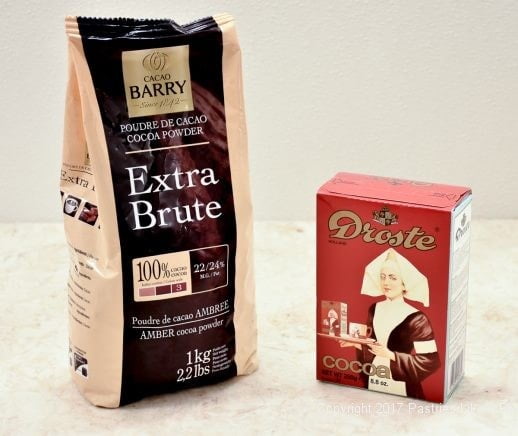
Dutched cocoa starts out like natural cocoa. However, the dutched cocoa uses beans that have been treated with potassium carbonate to remove the acidity before grinding into a powder resulting in a smoother more mellow taste and a darker color. The color depends upon the amount of dutching the cocoa and undergone. It has a pH factor of about 7 which is neutral and as a result calls for baking powder to have a product rise. Dutched cocoa usually has more fat content than natural and ranges between 22% to 24% cocoa butter. Professional pastry chefs prefer dutched cocoa for its deeper color and less acidic taste. It can be referred to as alkalized, dutched or European-style. Dutched Cocoa Brands include: Droste, Lindt, Valrhona, Poulain, Pernigotti and Cocoa Barry.
Hershey's Dark Cocoa is a third type of cocoa recently introduced onto the market. It is a combination of natural and dutched. I asked them for information on this chocolate and why they mixed them but have received no response. I have no idea what the pH factor is or whether it takes baking soda or baking powder as the preferred leavening agent.
Black Cocoa Powder is highly dutched cocoa. It is this type of cocoa used in Oreo's.
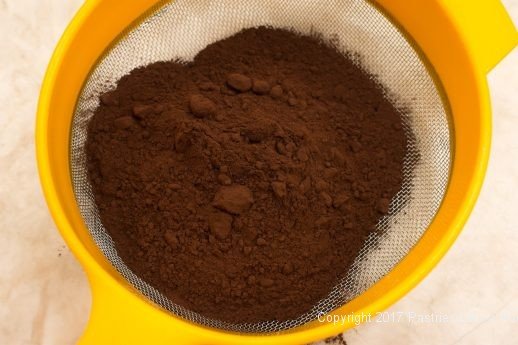
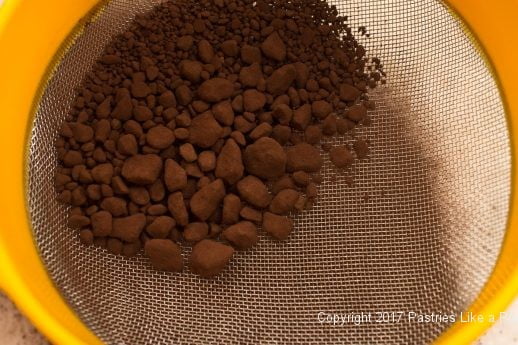
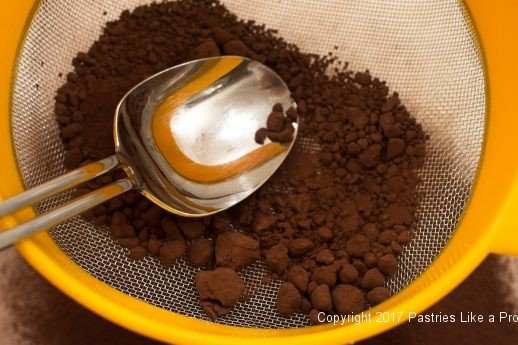
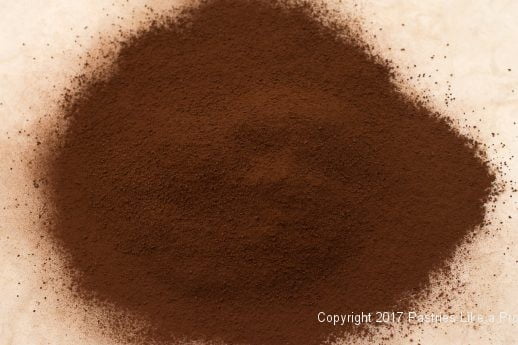
Using Cocoa as an ingredient
Both natural and dutched cocoas are lumpy. It is necessary when using them to press them through a strainer. If using flour and leavening and/or other dry ingredients in the recipe, it is best to sift them all together for the best disbursement in the mixture.
If mixing cocoa with a liquid, it is best to add a very little liquid to the cocoa to make a paste before adding the rest of the liquid to avoid lumps.
Are They Interchangeable?
If the recipe requires leavening then they are not. If no leavening is required they may be interchanged but be aware the flavor will be different as the natural is acidic and the dutched more mellow. The colors will also be different.
Storing Cocoa Powder
Cocoa powders may be stored for at least two years and up to three in a dark, cool, dry environment.
Substitutions
I have seen substitutions that suggest if you don't have dutched cocoa adding baking soda to natural cocoa would neutralize the acidity. But I would think you would also have to increase the shortening or butter to make up for the increased cocoa butter in the dutched cocoa. Because I have not tested this or other methods I can't recommend them.
Two sources for baking information regarding cocoa that do have substitutions are: https://www.joyofbaking.com/cocoa
https://www.kingarthurbaking.com/blog/2014/01/10/the-a-b-cs-of-cocoa
Internet sources for cocoa both natural and dutched:
https://www.chocosphere.com/default/catalogsearch/result/index/?chocolate_format=236&q=dutched+cocoa+powder
https://www.supermarketitaly.com/cacao-barry-cocoa-powder-extra-brute-
To Sum Up: Recipes using natural cocoa take baking soda as its leavening agent.
Recipes using dutched cocoa take baking powder as its leavening agent.
If no leavening is used either cocoa may be used in a recipe depending upon whether you like a sharper, slightly bitter taste of natural or the smoother, more mellow taste and darker color of dutched.
Other Sources for information on cocoa
https://www.davidlebovitz.com/cocoa-powder-faq-dutch-process-https://non www.joyofbaking.com/cocoa
https://joythebaker.com/2013/10/baking-101-natural-vs-dutch-processed-cocoa-powder/


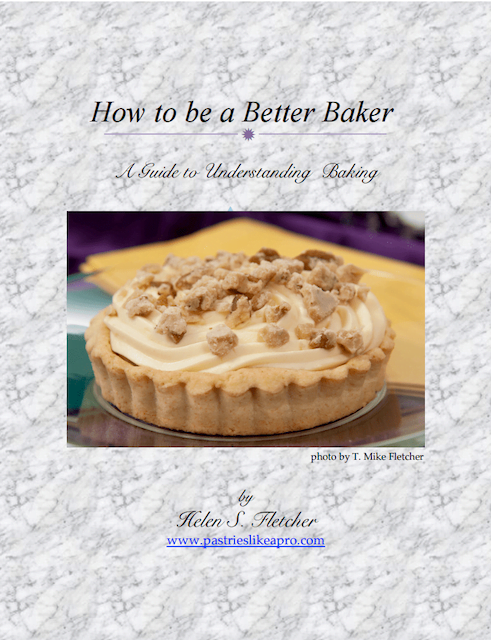

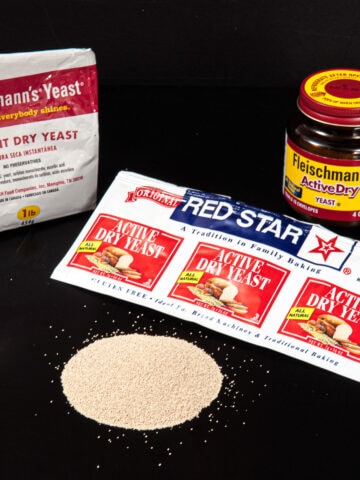
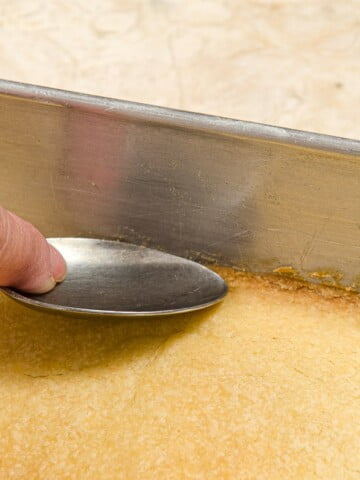
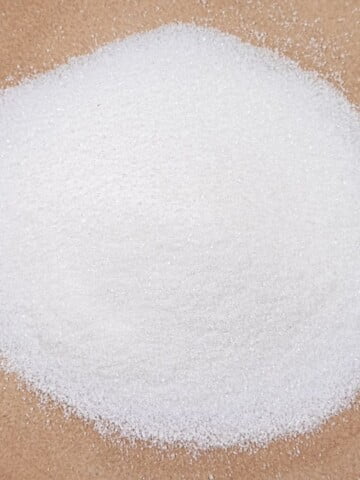
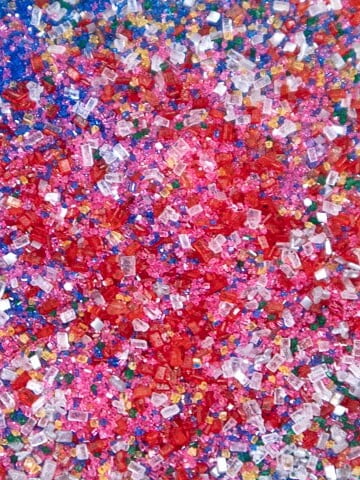
Diana M says
If you could clarify this, I would appreciate it. It's late, and I'm tired, so my brain is not computing this sentence:
"you would also have to increase the shortening or butter to make up for the
increased cocoa butter in the dutched cocoa"
If dutched cocoa already has more fat (butter), why would you use more butter or shortening?
It would seem you would need more butter or shortening in the cocoa that is not dutched as it has less cocoa butter.
Thank you. I enjoy your recipes and instruction.
Helen S Fletcher says
Hi Diana - The cocoa referred to under Substitutions refers to Natural Cocoa not Dutched Cocoa. As such it says, "But I would think you would also have to increase the shortening or butter to make up for the increased cocoa butter in the Dutched cocoa." You are not adding the increased butter or shortening to the Dutched cocoa but to the natural cocoa which has less. Hope this helps.
Diana M says
Thank you. Very helpful.
Helen S Fletcher says
Your welcome. Have a happy holiday.
Maria says
Hi Helen,
Thank you so much for blogging so many great recipes and tips. I found your blog through google. I'm an university student in New Zealand and your recipes are so accessible and inspiring for someone who's just moved out of home and doesn't have a full kitchen of bakeware yet, or all the knowledge of baking. I feel like I could master any of your recipes with some effort and preservation! Thank you so much for sharing your skill!
hfletcher says
Dear Maria - thank you so much for this lovely comment. You are exactly the person i am aiming for. You are right about learning to bake. It is not as difficult as many fear. Organization is a huge part and using a scale is important to the outcome. Good luck and if you have questions, just email me.
Hillary says
This was great! I have ALWAYS wanted to understand the difference and never knew. I also really appreciate giving us pictures of the different commonly known brands of each type of cocoa.
hfletcher says
Hi Hillary - So glad you enjoy this and it helped.
Rockyrd says
Another thank you, from me. Great info.
I have made all kinds of chocolate cakes/desserts and some suggest one or the other type of cocoa and some just don't say. Now thanks to you, I will have a better idea. I did use some of that special dark cocoa dark from Hershey and it says its a combo of natural and dutched. The things I made with it turned out unaturally dark- like almost black. Maybe that is what is used in those chocolate wafer cookies? You know the ones? My mom taught me to make whipped cream when I was in grade school ( a hundred years ago) using a hand operated egg beater and then to stack those wafers up to make ice box cake. Maybe now its called a refrigerator cake? They always have a coconut taste to them even though they are chocolate. I am going to look thru my cocoa stash and see exactly what I have here.
Thanks again.
hfletcher says
The Special Dark Cocoa undoubtedly uses the black cocoa which is highly dutched. The more the cocoa beans are dutched the darker the cocoa powder. I do remember the cake with the chocolate wafers and whipped cream. I never made it but I remember seeing it.
Barbara says
Thanks, Helen ! Very informative !
Barb
Debbie says
Thanks for this interesting article.
I use Cocoa Barry for my chocolate cake recipes, and always assumed it was “regular” because nothing on the package indicates it is Dutched. Anyway – my recipes all use 2 parts baking soda to 1 part baking powder and they come out spectacularly. So I’m guessing that using both leavening agents allows the cocoa to be interchangeable?
hfletcher says
Hi Debbie: Thanks for bringing this to my attention. I am having my distributor get in touch with Cocoa Barry to confirm what I was told. I just looked at the package and it is in French, which I do not speak. I too use a recipe for my base chocolate cake that uses both baking powder and baking soda. Many cakes using dutched cocoa call for both because, depending upon the rest of the ingredients, there might not be enough rising if only one is used. I will let you know as soon as I find out.
hfletcher says
Regarding the Cocoa Barry cocoa, the Extra Brute 22-24% fat cocoa is dutched. On the side of the 2.2 pound bag it states, "Cocoa Powder alkalized". Under that it says, " High fat cocoa processed with alkali - Ingredients: high fat cocoa powder processed with alkali". Hope that clears this up.
Manisha says
Thanx Helen
I also use Barry coco powder and now I know what kind it is - alkalized or acidic :)
Love
hfletcher says
Hi Manisha - Happy to hear from you. I enjoyed hearing about your Turtle Cake. I was happy to get the clarification regarding the Cocoa Barry too.
Debbie says
Thanks Helen! You're a star!
hfletcher says
Hi Debbie - and you are wonderful for thinking so.
valerie says
Helen, thank you so much! You leave no stone unturned! Excellent articles.
hfletcher says
Hi Valerie - thank you. I used to be confused as to where, when and what went on with the two cocoas. In time I got it though and am happy to pass it along.
mybobba1 says
What a fabulous article! You are the best.
hfletcher says
Thanks so much Marilyn - I love writing about the fundamentals of baking.
Joanne Fortson says
Thank you so very much for this explanation! I have several recipes I wanted to try that call for Dutch cocoa, but have not been able to find it in my local grocery store. So I was ready to try Hershey's for an Easter cake. Thanks for saving me from making a flop of a cake.
hfletcher says
Hi Joanne - glad I got the article posted, if for no other reason than your Easter cake. The dutched cocoas are more expensive but the Cocoa Barry, which is the one I use can be obtained on line for $16.99 for 2.2 pounds. I don't know what shipping would entail. I get it locally through the restaurant supplier but pay the same thing.
Nancy Forward says
Thoroughly enjoyed reading the article on different types of cocoa. Very informative. Now I know. Thank you so much.
Nancy
hfletcher says
Hi Nancy - glad it was helpful.